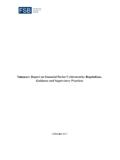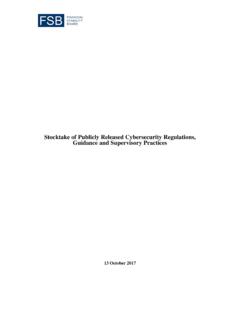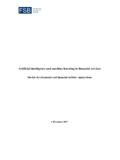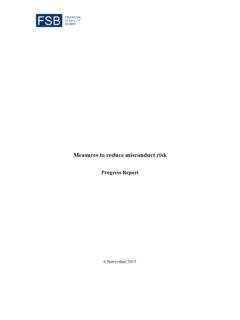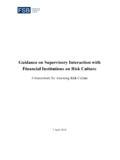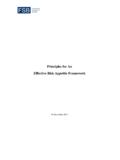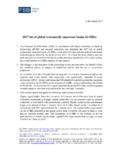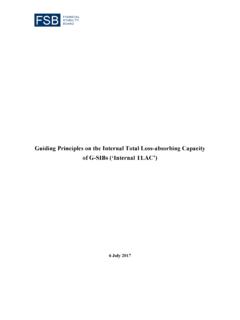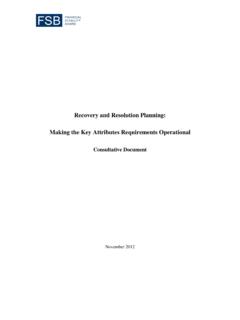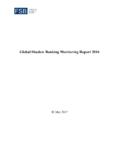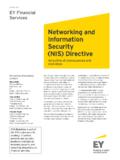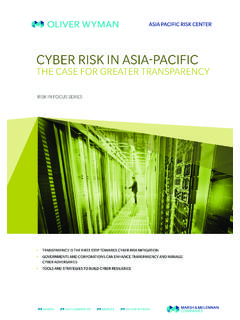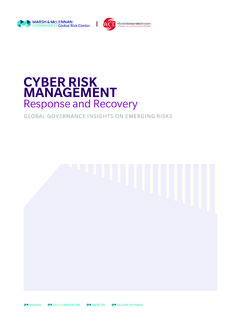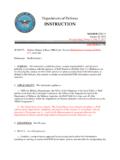Transcription of Cyber Lexicon: Consultative Document
1 Cyber Lexicon Consultative Document 2 July 2018 The financial Stability Board (FSB) is established to coordinate at the international level the work of national financial authorities and international standard-setting bodies in order to develop and promote the implementation of effective regulatory, supervisory and other financial sector policies. Its mandate is set out in the FSB Charter, which governs the policymaking and related activities of the FSB. These activities, including any decisions reached in their context, shall not be binding or give rise to any legal rights or obligations under the FSB s Articles of Association. Contacting the financial Stability Board Sign up for e-mail alerts: Follow the FSB on Twitter: @FinStbBoard E-mail the FSB at: Copyright 2018 financial Stability Board. Please refer to: iii Table of Contents Introduction.
2 1 1. Background .. 2 2. Objective of the lexicon .. 5 3. Development of the draft lexicon .. 6 Process for developing the draft lexicon .. 6 Selection of terms included in the draft lexicon .. 6 Criteria used in developing definitions for terms in the draft lexicon .. 7 4. Request for comment .. 8 Annex: Draft Cyber Lexicon .. 9 iv 1 Cyber Lexicon Introduction The Communiqu issued at the March 2017 meeting of the G20 Finance Ministers and Central Bank Governors in Baden-Baden noted that the malicious use of Information and Communication Technologies (ICT) could disrupt financial services crucial to both national and international financial systems, undermine security and confidence and endanger financial With the aim of enhancing cross-border cooperation, the financial Stability Board (FSB) was asked, as a first step, to perform a stocktake of existing relevant released regulations and supervisory practices in G20 jurisdictions, as well as of existing international guidance, including to identify effective practices.
3 In October 2017, the FSB delivered the requested stocktake report regarding existing publicly available regulations and supervisory practices with respect to Cyber security in the financial sector to the Finance Ministers and Central Bank Governors meeting in Washington, The Ministers and Governors welcomed the FSB stocktake report, asked the FSB to continue its work to protect financial stability against the malicious use of ICT and noted that this work could be supported by the creation of a common lexicon of terms that are important in the work being The FSB has now developed a draft lexicon of terms related to Cyber security and Cyber resilience, and is publishing the draft lexicon for public consultation. After considering the responses to this consultation, the FSB intends to finalise the lexicon for delivery to the G20 Summit in Buenos Aires in November of this year. The FSB welcomes comments on this Document .
4 Comments should be submitted by 20 August 2018 by email to All comments will be published on the FSB website unless a commenter specifically requests confidential treatment. 1 See G20, Communiqu : G20 Finance Ministers and Central Bank Governors Meeting, Baden-Baden, Germany, 17-18 March 2017, 2 See FSB, Summary Report on financial Sector Cybersecurity regulations , Guidance and Supervisory Practices, 13 October 2017, 3 See G20, Chair s Summary: G20 Finance Ministers and Central Bank Governors Meeting, Washington, , USA, 12-13 October 2017, ;jsessionid=B6890 DCD16EB588B45663F2C579BF598?__blob=publi cationFile&v=2. 2 Questions for public consultation (Please provide supporting reasons for your views.) The FSB invites comments on the draft lexicon and the following specific questions: Q1. Are the criteria used by the FSB in selecting terms to include in the draft lexicon appropriate in light of the objective of the lexicon?
5 (See Section 2 for the objective, Section for the criteria and the Annex for the lexicon.) Should additional criteria be used? Q2. Are the criteria used by the FSB in defining the terms in the draft lexicon appropriate in light of the objective of the lexicon? (See Section for the criteria.) Should any additional criteria be used? Q3. In light of the objective of the lexicon, should any particular terms be deleted from, or added to, the draft lexicon? If any particular terms should be added, please suggest a definition, along with any source material for the definition and reasons in support of inclusion of the term and its definition. Q4. Should any of the proposed definitions for terms in the draft lexicon be modified? If so, please suggest specific modifications, along with any source material for the suggested modifications and reasons in support thereof. Q5. Going forward and following the publication of the final lexicon, how should the lexicon be maintained to ensure it remains up to date and a helpful tool?
6 1. Background Cyber incidents are a threat to the entire financial system, a fact that is underscored by recent reports of significant and damaging incidents both inside and outside the financial sector. The 2016 attack on the Bangladesh Bank resulted in the theft of $81 million, the WannaCry ransomware attack in 2017 infected more than 250,000 computer systems in 150 countries, and the Equifax hack in 2017 resulted in the compromise of personal information of over 146 million Cyber risk to financial institutions is driven by several factors, including evolving technology, which can lead to new or increased vulnerabilities; interconnections among financial institutions and between financial institutions and external parties, through cloud computing and FinTech providers who in some cases may not be subject to regulation by financial sector authorities; determined efforts by Cyber criminals to find new methods to compromise ICT systems.
7 And the attractiveness of financial institutions as targets for Cyber criminals seeking illicit financial Recognising the risks from Cyber incidents, authorities 4 See How Cyber criminals targeted almost $1bn in Bangladesh Bank heist , financial Times, 18 March 2016, ; Ransomware Cyber -attack threat escalating Europol , BBC, 14 May 2017, ; and Form 8-K of Equifax Inc. (filed 7 May 2018), 5 For a discussion of Cyber risk in the context of FinTech ( technology-enabled innovation in financial services), see FSB, financial Stability Implications from FinTech: Supervisory and Regulatory Issues that Merit Authorities Attention, 27 June 2017, For an example of the evolution of attack methods, see B. Krebs, Source Code for IoT Botnet Mirai Released , 1 October 2016, 3 across the globe have taken regulatory and supervisory steps designed to facilitate both the mitigation of Cyber risk by financial institutions, and their effective response to, and recovery from, Cyber incidents.
8 The Communiqu issued at the March 2017 meeting of the G20 Finance Ministers and Central Bank Governors in Baden-Baden noted that the malicious use of ICT could disrupt financial services crucial to both national and international financial systems, undermine security and confidence and endanger financial The Ministers and Governors further noted that they would promote the resilience of financial services and institutions in G20 jurisdictions against the malicious use of ICT, including from countries outside the G20. With the aim of enhancing cross-border cooperation, the FSB was asked, as a first step, to perform a stocktake of existing relevant released regulations and supervisory practices in G20 jurisdictions, as well as of existing international guidance, including to identify effective practices. The FSB prepared a stocktake report (Stocktake Report) and summary report (Summary Report), which were informed by survey responses from FSB members and a public-private sector workshop in September The Stocktake Report explores existing publicly released regulations , supervisory practices and guidance in the area of Cyber security across the financial sector, including whether gaps exist and the degree of uniformity across the financial sector and FSB member jurisdictions.
9 The conclusions from the stocktake include the following. FSB member jurisdictions have been active in addressing Cyber security for the financial sector, with all 25 member jurisdictions reporting that they have publicly released regulations or guidance that address Cyber security for at least a part of the financial All or nearly all jurisdictions have addressed banks and financial market infrastructures, and a majority have addressed trading venues, insurance companies, broker-dealers and asset managers. All FSB member jurisdictions reported drawing upon a small body of previously developed national or international guidance or standards of public authorities or private bodies in developing their Cyber security regulatory and supervisory schemes for the financial sector, which suggests some degree of international convergence. Indeed, a number of content elements were commonly covered, governance; risk assessment; prevention, detection and reduction of vulnerability; training; and regulatory reporting.
10 Though similar, regulations and guidance are certainly not identical across jurisdictions, while some schemes were characterised as addressing operational risk generally, others were more targeted to Cyber security and/or ICT risk. For an outline of the high yield of recent attacks targeting the financial sector, see C. Wueest, Symantec, financial Threats Review 2017, Targeted financial heists , May 2017, 6 See G20, Communiqu : G20 Finance Ministers and Central Bank Governors Meeting, Baden-Baden, Germany, 17-18 March 2017, 7 See FSB, Stocktake of Publicly Released Cybersecurity regulations , Guidance and Supervisory Practices, 13 October 2017, ; and FSB, Summary Report on financial Sector Cybersecurity regulations , Guidance and Supervisory Practices, 13 October 2017, 8 The FSB member jurisdictions are Argentina, Australia, Brazil, Canada, China, France, Germany, Hong Kong, India, Indonesia, Italy, Japan, Korea, Mexico, Netherlands, Russia, Saudi Arabia, Singapore, South Africa, Spain, Switzerland, Turkey, United Kingdom, United States and the European Union.
